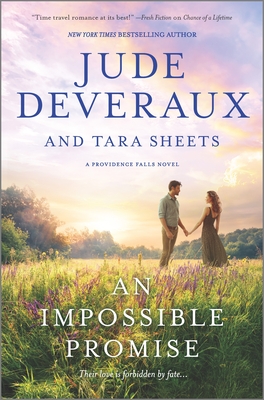 An Impossible Promise: A Novel by Jude Deveraux
An Impossible Promise: A Novel by Jude Deveraux Format: eARC
Source: supplied by publisher via NetGalley
Formats available: hardcover, large print, paperback, ebook, audiobook
Genres: historical romance, time travel romance
Series: Providence Falls #2
Pages: 288
Published by Mira on September 21, 2021
Purchasing Info: Author's Website, Publisher's Website, Amazon, Barnes & Noble, Kobo, Bookshop.org
Goodreads
They can’t be together, but they can’t stay apart…
Liam O’Connor has one purpose in this life—to push the woman he loves into the arms of another man. The Irish rogue unknowingly changed the course of destiny when he fell in love with Cora McLeod over a century ago. Their passion was intense, brief and tragic. And the angels have been trying to restore the balance of fate ever since.
Now police officers in Providence Falls, North Carolina, Liam and Cora are partners on a murder investigation. The intensity of the case has drawn them closer together—exactly what Liam is supposed to avoid. The angels have made it clear Cora must be with Finley Walsh. But headstrong Cora makes her own decisions and she’s starting to have feelings for Liam—the only thing he’s ever really wanted.
Liam knows this is the last chance to save his soul. But does he love Cora enough to let her go?
Providence Falls
Book 1: Chance of a Lifetime
My Review:
Okay, I’m hooked. Also confused, frustrated and annoyed – but hooked. I have to find out how this whole soap opera turns out.
Which constitutes fair warning on two counts. Count number one, that the insane story begun in Chance of a Lifetime does NOT conclude in An Impossible Promise. Count number two, this series is one story broken up into chapters, not two separate stories with some kind of link between them. In other words, you have to start at the beginning and it’s not done yet.
The third book isn’t even announced yet. Hence both the frustration AND the annoyance. I want to know how this is all going to get resolved – if only to find out if ANY of my guesses are right. And I need to know that the answers will be forthcoming at hopefully the not too distant future, but at least at some fixed date in the future.
Let me explain, which isn’t going to be easy because this story, at least so far, completely broke my willing suspension of disbelief meter and then set it on fire. This story needs resolution in the hopes that at the end it will all make sense.
The concept for the whole thing, as I discussed in my review of the first book in the series last week, has a lot of potential. It’s a time travel romance with a bit of angelic interference taking the place of any SFnal handwavium that often powers the jaunt through time.
What makes this different from the usual run of such things is that Liam O’Connor doesn’t go backward in time – he goes forward. From 1844 to an undefined present day probably just pre-pandemic.
Way back when, Liam O’Connor messed with Cora McLeod’s destiny when he convinced her to run away with him rather than marrying the man her father picked out for her. Whatever that destiny was, it was so huge and important that the angels, two of them specifically, have given Liam a second chance to get it right by giving up the woman he really does most sincerely love.
The angels fast forward Liam to now, where Cora McLeod, still with the same name, has another chance to marry her destined mate, Finley Walsh. It’s up to Liam to put aside his own desires – and honestly Cora’s as well – to make sure that this time things turn out the way they were supposed to.
All the while pretending to be a 21st police detective in a tiny town in North Carolina, learning how to live in a world he never imagined, while helping Cora solve a series of murders that have everyone in town on edge.
While a couple of meddling angels blow celestial trumpets in his ears to remind him that he only has three months to fix what he broke long ago before he goes straight to hell.
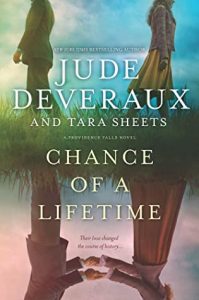 Escape Rating C+: As I said at the top, I am hooked on this story, and eaten up with speculation about how the whole thing is finally going to be worked out. But, but, but there are a whole lot of things about this story that drive me crazy because they don’t make sense – or at least they don’t make sense without a whole lot more explication than we have so far.
Escape Rating C+: As I said at the top, I am hooked on this story, and eaten up with speculation about how the whole thing is finally going to be worked out. But, but, but there are a whole lot of things about this story that drive me crazy because they don’t make sense – or at least they don’t make sense without a whole lot more explication than we have so far.
Liam, at one point in this book, asks the angels who have stuck him in this situation whether they are really angels or whether they’re working for the other side. I do not blame him AT ALL for wondering. They say they’re working for the “greater good” and all that, but anyone who works for the so-called “greater good” without explaining a whole lot about whose good and why it’s greater makes me twitchy and gives me mad Albus Dumbledore vibes and not in a good way.
Liam was kind of “voluntold” to participate in this mess, but it seems like everyone else is being manipulated rather a lot in order to accept Liam’s place in the world and in all of their lives. It also feels like a vast coincidence, beyond any angelic arrangement, that all the people in Providence Falls are reincarnations of the people Liam and Cora knew in their first go around, that they ALL have the same names and they are all in the same relationships to Liam, to Cora, and to each other.
The long arm of coincidence does not stretch that far – even in fiction.
Aside from the setup, the big issue in this romance is the romance. Liam really does love Cora, past and present. Cora is falling for Liam, again, even though she doesn’t remember their first time around.
Because we experience the story from Liam’s perspective, he’s the one we have empathy for. We want him to get his HEA and there’s no way that happens if he fulfills his promise to the angels. The entire story goes against the grain of the way it’s being told, especially when Cora’s growing feelings for Liam are taken into consideration. That she is not getting to make her own choices just bites. Seriously.
That’s not to say that this incarnation of Finley Walsh isn’t a good guy or in any way unworthy – but he’s not Cora’s choice. Although at least the story gives us a little more depth about him in this second installment. I would be happy to see Finn get his own HEA, but so far at least I’m not on board with that HEA being with Cora.
That’s where all of my thoughts about how this is going to play out go pear-shaped. At the end of this book, Liam finally gets a full explanation of why Cora has to marry Finn – but we don’t see it. All we get is Liam’s epiphany that his wants don’t matter, that Cora’s destiny is too important for him to mess up.
The problem I’m having is that I just don’t believe it. I’m not convinced. At all. The angels could be manipulating him, they could have shown him something that leads to this conclusion without it being the truth, and they could still be demons. On an entirely other hand they could be demons like Crowley (in Good Omens) was a demon, meaning that they might be doing the right thing in the wrong way and for the wrong reasons. That’s actually an explanation I could seriously get behind.
But I want to know so, so badly. So I’m hooked. Along with being confused, frustrated and annoyed. The next book can’t come out soon enough. The horns of this particular dilemma are downright painful!


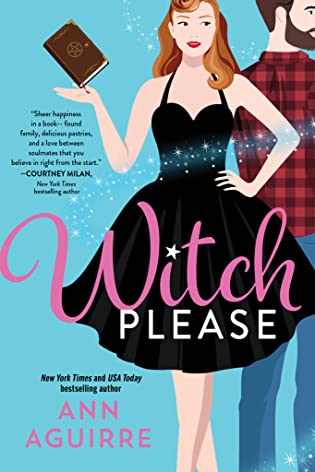 Witch Please (Fix-It Witches, #1) by
Witch Please (Fix-It Witches, #1) by 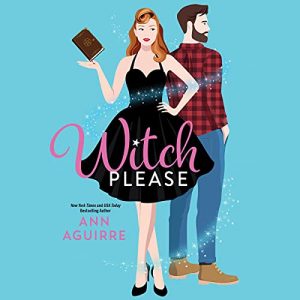 Escape Rating B-: I am of two minds on this book in so many ways!
Escape Rating B-: I am of two minds on this book in so many ways!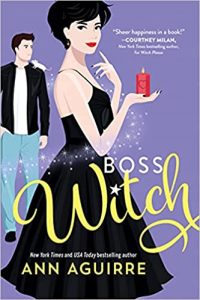 I was also fairly convinced early on that Gram was pretty much the Wicked Witch of the (Mid)West, so I wasn’t exactly surprised to discover that my conviction was close to the actual mark and not just my own feelings about just how toxic her manipulations really were. And I’ll admit that I really needed to see an epic takedown of Gram over this and did not get the catharsis I was looking for.
I was also fairly convinced early on that Gram was pretty much the Wicked Witch of the (Mid)West, so I wasn’t exactly surprised to discover that my conviction was close to the actual mark and not just my own feelings about just how toxic her manipulations really were. And I’ll admit that I really needed to see an epic takedown of Gram over this and did not get the catharsis I was looking for.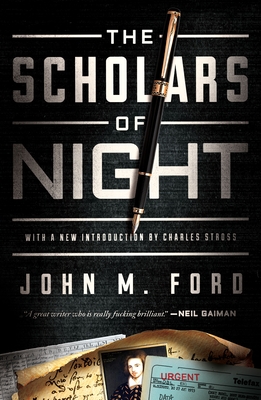 The Scholars of Night by
The Scholars of Night by 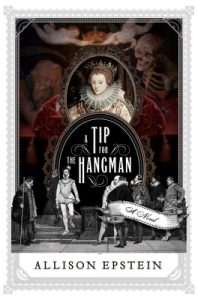 Escape Rating A: The story in The Scholars of Night is complex and convoluted and wonderful. No one trusts anyone else, no one is really on anyone else’s side, everyone is waiting for everyone else to betray them – with good reasons – and everyone is unreliable because no one is telling the truth about anything even when they think they know the truth.
Escape Rating A: The story in The Scholars of Night is complex and convoluted and wonderful. No one trusts anyone else, no one is really on anyone else’s side, everyone is waiting for everyone else to betray them – with good reasons – and everyone is unreliable because no one is telling the truth about anything even when they think they know the truth.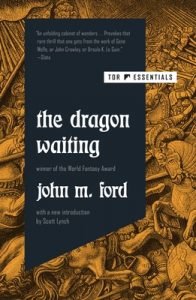 Reviewer’s Note: The story about how this book and the rest of John M. Ford’s work went so thoroughly out of print – with the exception of his Star Trek novelizations – and how they finally got back into print (and ebook for the first time!) is a bit of a puzzle story in and of itself.
Reviewer’s Note: The story about how this book and the rest of John M. Ford’s work went so thoroughly out of print – with the exception of his Star Trek novelizations – and how they finally got back into print (and ebook for the first time!) is a bit of a puzzle story in and of itself.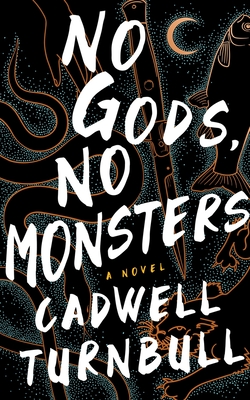 No Gods, No Monsters (The Convergence Saga, #1) by
No Gods, No Monsters (The Convergence Saga, #1) by 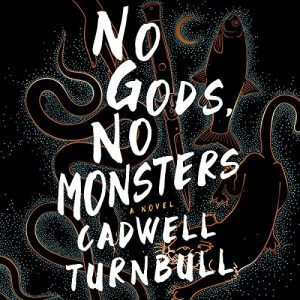 Speaking of perspectives, at least in the audiobook that I listened to they blurred into each other just a bit. The reader was good, and if his voice was intended to represent the unreliable narrator we begin and end the story with, he does a good job of representing that particular voice. But this story has a LOT of voices, all of whom are unreliable to one degree or another – some because they don’t know what they don’t know, and some because they don’t want to know what they don’t know – and the audio might have worked a bit better if there had been a few more narrators to help the listener keep track.
Speaking of perspectives, at least in the audiobook that I listened to they blurred into each other just a bit. The reader was good, and if his voice was intended to represent the unreliable narrator we begin and end the story with, he does a good job of representing that particular voice. But this story has a LOT of voices, all of whom are unreliable to one degree or another – some because they don’t know what they don’t know, and some because they don’t want to know what they don’t know – and the audio might have worked a bit better if there had been a few more narrators to help the listener keep track.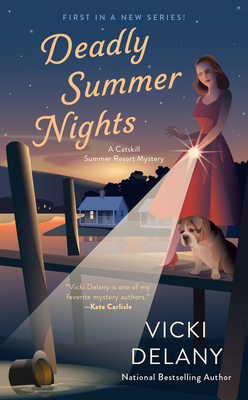 Deadly Summer Nights (Catskill Summer Resort Mystery #1) by
Deadly Summer Nights (Catskill Summer Resort Mystery #1) by 
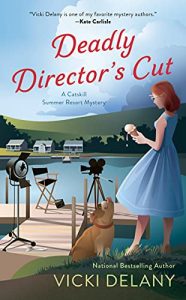 At first, I couldn’t figure out what was missing at Haggerman’s, until I realized that the context of who the clients were and who many of the owners were was entirely missing. If it was subtext it was so sub that I missed it. And I feel like a lot of the flavor of the area was lost.
At first, I couldn’t figure out what was missing at Haggerman’s, until I realized that the context of who the clients were and who many of the owners were was entirely missing. If it was subtext it was so sub that I missed it. And I feel like a lot of the flavor of the area was lost.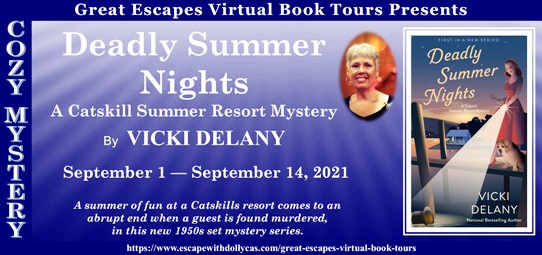
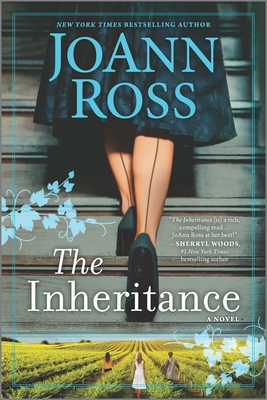 The Inheritance by
The Inheritance by 
 Write My Name Across the Sky by
Write My Name Across the Sky by  This is the story of two pairs of sisters all of whom were, in their own ways, trailblazers. Sam and Willow are in their late 30s when this story opens. Sam was one of the first women to head her own gaming company, and one of the first to design action/adventure games specifically intended to appeal to girls. While her company was an “overnight” success 20 years ago, in internet time, 20 years is a century, and her company is floundering.
This is the story of two pairs of sisters all of whom were, in their own ways, trailblazers. Sam and Willow are in their late 30s when this story opens. Sam was one of the first women to head her own gaming company, and one of the first to design action/adventure games specifically intended to appeal to girls. While her company was an “overnight” success 20 years ago, in internet time, 20 years is a century, and her company is floundering.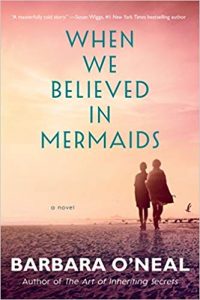 Like the two previous books by this author that I have read,
Like the two previous books by this author that I have read, 
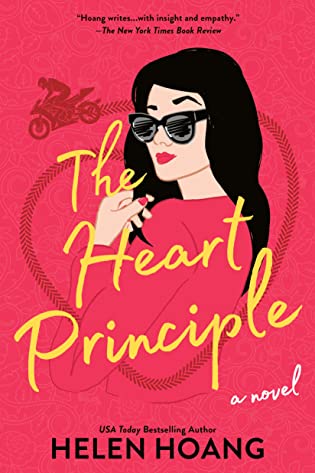 The Heart Principle (The Kiss Quotient, #3) by
The Heart Principle (The Kiss Quotient, #3) by 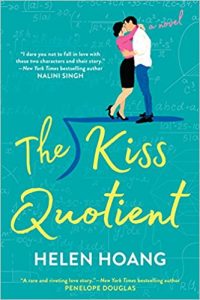
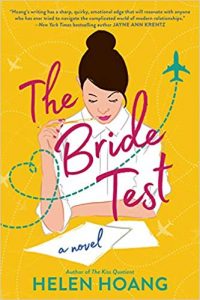
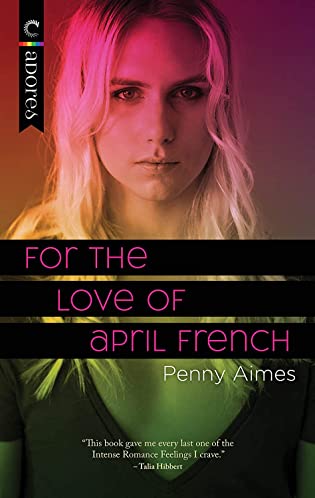 For the Love of April French by
For the Love of April French by 
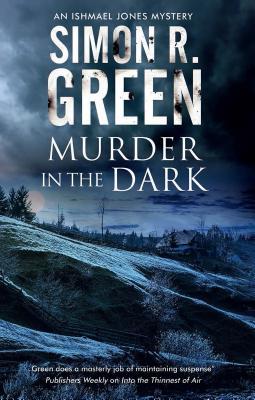 Murder in the Dark (Ishmael Jones, #6) by
Murder in the Dark (Ishmael Jones, #6) by 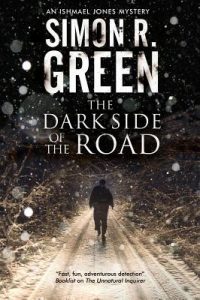 The stories in this series, for the most part, have been a play on the old country house murders. Ishmael met his romantic and investigative partner Penny Belcourt in the first book in the series,
The stories in this series, for the most part, have been a play on the old country house murders. Ishmael met his romantic and investigative partner Penny Belcourt in the first book in the series, 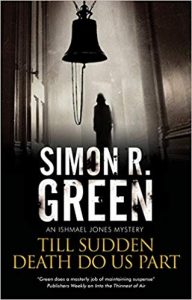 The thing that makes this series work is that in spite of any supernatural or extraterrestrial red herrings that may appear while Ishmael and Penny are desperately trying to figure out who’s bumping off the people they’re supposed to save, the reality turns out to be that the biggest, baddest and deadliest monsters in any setting are human. The evil that people are capable of doing to each other is much, much scarier than any mythical beast or raygun toting alien. That in the end the most horrible monsters are just people doing bad things because they’re selfish and greedy. And it’s that grounding in human monsters and human evil that keep the whole thing from flying over the top, jumping the shark, and landing in a cesspit full of slime monsters.
The thing that makes this series work is that in spite of any supernatural or extraterrestrial red herrings that may appear while Ishmael and Penny are desperately trying to figure out who’s bumping off the people they’re supposed to save, the reality turns out to be that the biggest, baddest and deadliest monsters in any setting are human. The evil that people are capable of doing to each other is much, much scarier than any mythical beast or raygun toting alien. That in the end the most horrible monsters are just people doing bad things because they’re selfish and greedy. And it’s that grounding in human monsters and human evil that keep the whole thing from flying over the top, jumping the shark, and landing in a cesspit full of slime monsters.